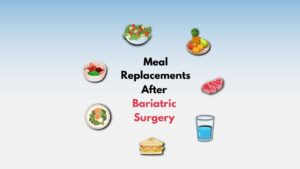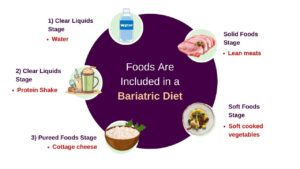Malnutrition: How To Avoid This Risk After Weight Loss Surgery

Weight loss surgery offers an effective solution to chronic obesity and the numerous health problems associated with it. This surgery marks the beginning of a healthier and happier life. Commonly referred to as bariatric surgery, weight loss surgery permanently alters the body, providing long-term solutions.
While bariatric surgery can be highly effective in achieving weight loss goals, but at the same time one should be taking care of their macro and micro nutrition post-surgery. In this blog let’s explore various strategies to mitigate the risk and ensure that individuals can fully enjoy the benefits of bariatric surgery to have a smooth and free from obesity life.
Understanding Bariatric Surgery
One of the most common forms of bariatric surgery is gastric bypass. This surgical procedure involves reducing the size of the stomach and rerouting the digestive tract by bypassing a portion of the small intestine. This significant alteration in digestion leads to substantial weight loss.
Another bariatric surgery called Sleeve Gastrectomy, also known as Vertical Sleeve Gastrectomy is also a type of weight loss surgery. In this surgery 75- 80% of stomach is removed; leaving a tube sized stomach; shaped like a Banana. This smaller size of stomach reduces the appetite and resulting in weight loss. In addition to this it treats other co-morbidities like Blood Pressure, Diabetes Type 2, Thyroid, Sleep Apnea.
Understanding Post-Op Malnutrition
Malnutrition is a condition where the body lacks sufficient nutrients to function, develop, and grow. Malnutrition refers to deficiencies in micronutrients as well as macronutrients.
Micronutrients include all the minerals and vitamins our body needs to produce hormones, enzymes, and various other substances. Macronutrients include proteins, fats, and carbohydrates. Therefore, its is important to include them in an appropriate amount into our daily meals.
After bariatric surgery, protein-rich foods are usually advised by the nutritionist so that there is optimum amount of protein for faster recovery and good nutrition. Although post op malnutrition doesn’t take place when the patient follows the guideline adequately as suggested by the nutritionist.
The prevalence of malnutrition following weight loss surgery typically arises only when postoperative instructions are disregarded, so it’s crucial for the patient to follow the instructions actively.
Medical professionals are aware of this issue and take proactive measures to prevent it. It is recommended that patients undergo a thorough nutritional assessment, including the measurement of micronutrients, both before and after undergoing bariatric surgery.
However, in cases where malnutrition occurs a team of dietitians and nutritionist help you out to retain the normal levels by guiding you with foods that give you adequate nutrition.
Identifying the Signs of Malnutrition
As soon as you observe or suspect any of these signs, it is advised to take immediate medical attention. The earlier these deficiencies are detected, the more favourable the outcome.
Lack of protein leads to muscle loss, lethargy, and fatigue. Protein deficiency also leads to a big appetite and thus it is important to incorporate protein rich food in your daily meal.
When the body isn’t getting enough vitamins, we experience fatigue, weakness, etc. to resolve these problems supplements that are prescription strength, protein shakes, or other supplemental drinks that are high in nutrients may be added to the diet by the doctor or nutritionist.
Understanding Bariatric Surgery
Changing your diet, making behavioural changes, and being regular in your doctor’s visits is not just a routine post-op task; it’s an exercise in the old maxim, ‘prevention is better than cure’.
On that account malnutrition can be avoided by taking preventive measures. So, patients who have undergone bariatric surgery can maintain their health, achieve successful weight loss, and prevent malnutrition by ensuring they follow these steps.
Eat Well
Follow your doctor’s and nutritionist’s guidance by consuming a nourishing diet that includes a variety of whole foods. This entails incorporating fruits, vegetables, and lean protein into your meals.
Keep an eye on empty calories found in processed foods, sugary items, junk foods, and beverages. The potato chips and the juice pack might not seem too harmful, but they are packed with calories, carbohydrates, and sugars. If you can’t stop snacking, look for alternate, healthier snacks.
Processed sugar can also trigger dumping syndrome, characterized by symptoms such as nausea, sweating, cramping, rapid heartbeat, and diarrhoea. Not only is that uncomfortable, but these symptoms will also drain all the nutrients out of your body.
While drinking an adequate amount of water may not directly prevent nutritional deficiencies, this zero-calorie beverage can reduce your overall calorie intake. Over time, it can also assist in replacing sodas and junk food with nutritious alternatives.
Never Miss a Doctor’s Appointment
A registered dietitian nutritionist will play a crucial role in your weight loss journey, working alongside your surgeon and doctors. If you’re a bariatric patient, it’s important to schedule consultations with them both before and after your surgery. They will closely monitor your nutritional requirements, and intake, and can detect malnutrition in its early stages.
Follow the Dietary Guidelines and Restrictions Post-Surgery
You’d also be prescribed several supplements by your doctor to prevent malnutrition. Take the daily recommended dose to avoid nutritional deficiencies and to regain your strength and health.
Ideally, you should be consuming vitamins B1 and B12, Folic Acid, Vitamin D, calcium copper, and zinc, either in the form of supplements or food:
The supplements will also enhance energy levels and contribute to an overall sense of well-being.
Make Behavioural Changes
Choosing to sidestep alcohol is not only important to making the surgery successful but also essential in preventing malnutrition. Alcohol is calorie-rich and offers no nutritional value.
It not only impedes your weight loss progress but can also contribute to nutritional deficiencies due to its carbohydrate content. Moreover, it can lead to neglect in taking your supplements and sticking to your dietary plan.
Read also; The Cost of Bariatric Surgery in India
Why We Are?
- Asia's Trusted Bariatric Center
- Centre of Excellence
- Patient Trusted Highly Volume Bariatric Center in Mumbai
- EMI, Cashless & Mediclaim Facilities are Available
- Daily Patients Follow-up after Bariatric Surgery
- Patient Support Group Every Month
- Obesity Awareness Program
- Available with Latest Technologies
- 18+ Experience in Weight Loss Bariatric Surgery
- 300+ Weight Loss Diet Plan & Recipes
- Highly Trained & Experienced Bariatric Nutritionist
- Patient WhatsApp Chat Group
- & Many More
Medically reviewed by Dr. Manish Motwani, Bariatric & Metabolic Laparoscopic Bariatric Surgeon — Curated by Akansha Mishra








